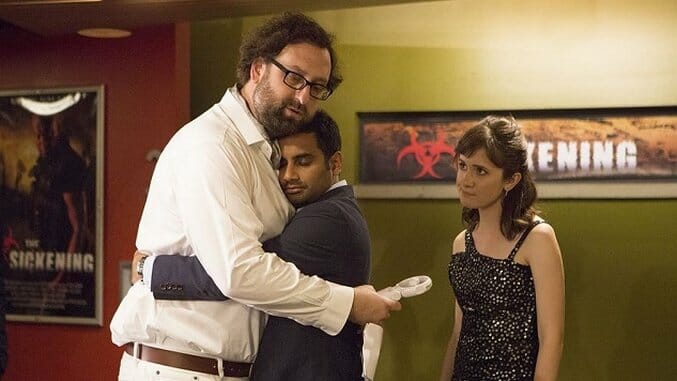Master of None: “Finale” (1.10)

“Finale” is a grab bag. Nearly every supporting player—Arnold, Benjamin, Bryan, Denise and Dev’s dad Ramesh—makes an appearance. The Sickening storyline comes to an end, as does the Dev-Rachel romance—or this chapter of it, at least. The episode contains a fairly even mix of playful sequences about modern life (Dev scouring the Internet for the perfect taco for a full 45 minutes), social commentary (reflections on the institution of marriage), and relationship drama (Rachel deciding to call it quits and move to Tokyo after Dev voices some doubts about their future).
Much like Dev, then, “Finale” doesn’t commit. It wants to do everything that Master of None is good at in the space of half an hour. After an episode devoted solely to the Dev-Rachel relationship, the assorted quality of the finale is welcome, even if it feels, at times, awkwardly pasted together.
As is the custom in sitcoms, a friend’s wedding serves as the catalyst for Dev to question his two-year relationship with Rachel. As the couple exchanges vows, Dev envisions himself and Rachel at the altar instead, delivering cynical takes on the genre like: “Are you the one person I’m supposed to be with? I don’t fucking know. But what’s the other option? We break up? That seems shitty, too!” To be honest, the show’s take on marriage as a “possibly outdated institution” is a tad sophomoric. Divorce rates have been falling for 20 years, and couples who tie the knot, contrary to popular belief, do have a better than 50-50 chance of making it work. Marriage is doing just fine, which doesn’t invalidate Dev’s fears, but it makes the show’s metatextual jab at it feel angsty.
Apart from that scene, Master of None’s take on the commitment-phobic man is certainly thoughtful—a meditation on Sylvia Plath’s The Bell Jar is one of the series’ most poignant moments—but it’s still another story about a guy who drags his feet because marriage is scary or something.
For a show that has been wildly inventive, and that has taken on fresh topics like the representation of Indians on television, immigration stories and gendered harassment, it’s been disappointing to watch the more conventional romantic subplot dominate the back half. Sure, the show covers this traditional territory with skill, but after so many glimpses of what it can be at its best, it’s hard to watch its orbit tighten around themes that have already been explored.
-

-

-

-

-

-

-

-

-

-

-

-

-

-

-

-

-

-

-

-

-

-

-

-

-

-

-

-

-

-

-

-

-

-

-

-

-

-

-

-








































